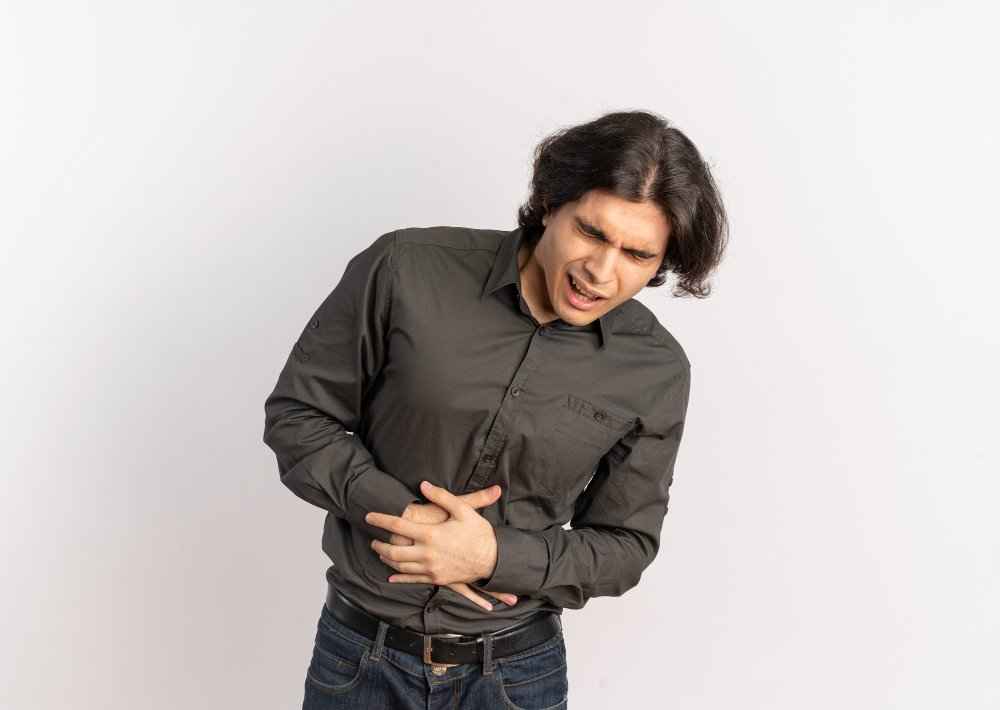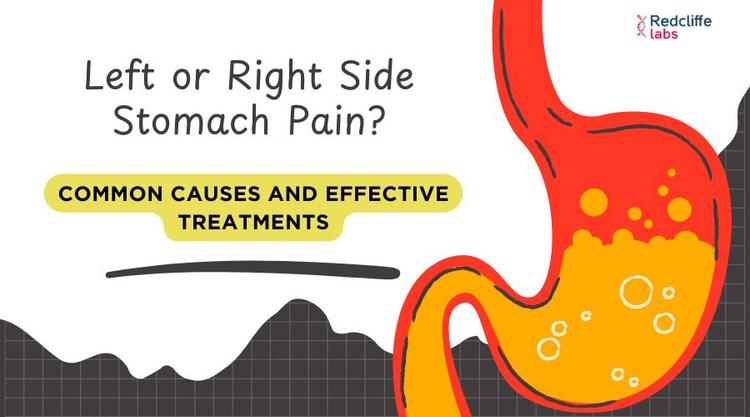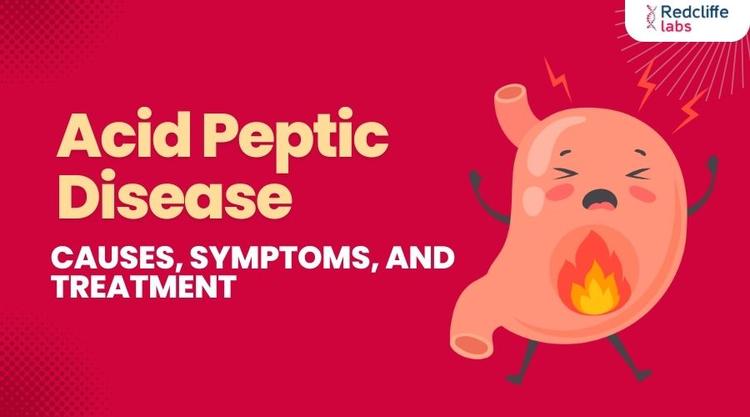Stomach TB: Symptoms, Causes, Complications, & Treatment

Medically Reviewed By
Prof. Ashok Rattan
Written By Muskan Taneja
on Nov 8, 2024
Last Edit Made By Muskan Taneja
on Jul 19, 2025

Stomach TB is a more rare medical condition than pulmonary tuberculosis (TB). It is easily curable and preventable with early detection, treatment, and diagnosis. Loss of appetite, fever, and abdominal pain are some common stomach TB symptoms. With the necessary steps towards prevention and treatment, you can counter TB effectively.
The World Health Organization (WHO) reports that tuberculosis is a leading cause of death in the world, among which stomach TB contributes 2-3% of all tuberculosis cases. Redcliffe Labs, India’s trusted diagnostic lab, can help manage stomach TB by spreading awareness about its symptoms, causes, risks, and diagnosis. So, without wasting any more minutes, let’s begin.
Let’s Understand Stomach TB, Its Types, Symptoms, & Causes
Tuberculosis affects around 10 million people. TB can affect any organ of the body, while abdominal tuberculosis (AbT) can affect lymph nodes, intestines, and solid visceral organs.
The medical community popularly refers to stomach TB as gastrointestinal TB or abdominal TB. It is a rare medical condition, yet it can cause severe health complications. Studies reveal that stomach TB accounts for 1.3 cases of every 100 patients.
Research shows that stomach TB is difficult to diagnose because the signs and symptoms are identical to other infections, diseases, and illnesses. You can have a timely diagnosis by monitoring stomach TB symptoms.

Types of Stomach TB
Doctors divide stomach TB into various types. These include
-
Gastrointestinal (GI) TB
Gastrointestinal TB is an infection that affects the peritoneum and other organs. You may experience sudden weight loss, anemia, bleeding, and severe abdominal pain in GI TB. It can affect your gastrointestinal tract.
-
Peritoneal TB
Peritoneal TB is similar to that of GI TB. You may experience the same symptoms as well, which creates confusion about an accurate diagnosis. Consult your doctor for an accurate diagnosis. Some people with an HIV infection, diabetes, anti-tumor necrosis factor, and hepatic cirrhosis are at risk of peritoneal TB.
-
Tuberculous Lymphadenopathy
When mycobacteria infection affects your lymph nodes, it creates a situation of tuberculous lymphadenopathy. You can experience weight loss, excessive sweating, swollen lymph nodes, and asthenia. There are three stages of tuberculous lymphadenitis. Your doctor can diagnose the stage after monitoring your symptoms and lymph nodes.
-
Hepatobiliary TB
Hepatobiliary TB directly affects your bile duct system and liver. Tuberculosis infection in the gastrointestinal tract or lungs can cause hepatobiliary TB. A person affected with hepatobiliary TB may experience abdominal pain, fever, unexplained weight loss, weakness, chest pain, and jaundice. Your doctor may recommend a liver biopsy or abdominal radiographs to diagnose this medical condition. In very rare cases, they might recommend surgery.
-
Visceral TB
Visceral TB can mimic itself like other diseases like inflammatory bowel disease and cancer. Although, the infection affects your gastrointestinal tract, viscera, and peritoneum. The symptoms are kind of the same as other types of stomach TB, including weight loss, fever, diarrhea, constipation, bloating, or fatigue.
-
Ulcerative TB
Ulcerative tuberculosis is an intestinal TB that occurs in the small intestine with superficial ulcers. During ulcerative TB, a person can experience chronic diarrhea, vomiting, abdominal pain, and malabsorption. Your doctor may diagnose this condition with endoscopy, polymerase chain reaction (PCR) test, and certain anti-tuberculous drugs.
-
Hypertrophic TB
Hypertrophic tuberculosis includes hypertrophic pachymeningitis, hypertrophic intestinal tuberculosis, and hypertrophic cecal tuberculosis, which can cause severe headaches, abdominal pain, and intestinal obstruction, respectively.
-
Ulcero-hypertrophic TB
Ulcero-hypertrophic TB is a combination of ulcerative and hypertrophic TB. It is a common form of gastrointestinal (GI) TB, which causes thickening and ulceration in the intestinal wall. Your doctor might recommend antituberculosis treatment (ATT) for a minimum of six months.
-
Fibrous Stricture
The fluid buildup of collagen, scar tissues, and other fibrous materials causes fibrous stricture. Chronic inflammation, infection, or injury in your intestinal wall are the major causes. You may experience blocked bowels, constipation, and difficulty in passing stool (poop) or gas.
People with Crohn’s disease have a 50% and 70% chance of developing fibrous structures in five and ten years, respectively. A doctor can suggest surgery or endoscopic dilation for diagnosis.
Stomach TB Symptoms and Causes
Pulmonary tuberculosis is the major reason for abdominal TB. Mycobacterium tuberculosis bacteria affect TB. These bacteria can pass on to your lungs and cause cough, sneeze, and other respiratory issues. Let’s know in detail about stomach TB symptoms and causes.
7 Symptoms of Stomach TB
Identifying symptoms can help in early detection, proper management, and timely treatment. Here are seven symptoms of stomach TB or abdominal tuberculosis.
-
Abdominal pain
Abdominal pain is a severe pain normally occurring in the lower abdomen. A person can experience dull, colicky, or persistent abdominal pain. Preventive measures and detection can help prevent its severity, as severe pain may lead to complications.
-
Weight loss
Weight loss is one of the common symptoms of stomach TB. TB in the stomach can cause a loss of appetite, which creates difficulty in absorbing nutrients, gradually resulting in weight loss. If you experience a sudden weight loss, consult your doctor and take preventive steps.
-
Sweat during the night and fever
Sweating during the night is not a common thing; it can be a sign of stomach TB or other serious medical conditions. Fever, chills, and fatigue often occur together in such a situation. It can be chronic or mild, however, you should take a medical consultation for proper understanding.
-
Diarrhea
Stomach TB directly affects your abdominal area, which creates an irregular bowel movement. You can experience chronic diarrhea and even bloody diarrhea, which can later create inflammation in the intestines.
-
Abdominal distension
Ascites is a common stomach TB symptom. Ascites is a situation when your abdomen swells because of the fluid accumulation in the peritoneal cavity. It may lead to an increase in abdominal girth.
-
Fatigue or Weakness
The research found that people with stomach TB experienced chronic fatigue or weakness. Medical conditions such as fever and weight loss often lead to fatigue. Weakness can make the condition even worse. Better consult a doctor as soon as you locate the symptoms.
-
Swollen lymph nodes
Stomach TB creates a situation of swollen or enlarged lymph nodes, mostly occurring in the groin region. It can make your immune system weak to fight stomach TB infection.

Causes of Stomach TB
The bacteria called Mycobacterium tuberculosis cause TB. This later spreads to other organs of the body. It is a bacterium that can cause stomach TB.
An infected person can transmit the infection by coughing, sneezing, or speaking to another person.
You can catch stomach TB through milk if you are drinking milk containing mycobacterium bovis bacteria.
Some medical conditions that can cause stomach TB symptoms include.
- Gastric ulcer
- Sarcoidosis
- Sarcoma
- Gastric cancer
- Colorectal cancer
- Esophageal tumor or ulcer
- Crohn’s disease
- Esophageal cancer
Risk and Complications of Stomach TB
These are some common causes leading to stomach TB symptoms. However, that’s not where it stops. These causes may lead to some complex complications.
-
Anemia
Research found that 61.53% of patients have anemia, which can be caused by inflammation, jaundice, and a poor nutritious diet.
Tuberculosis treatment takes up to weeks, which can cause infertility in both women and men. It can cause tubal damage, endometrial scarring, ectopic pregnancy, and irregular menstrual cycle in females. However, with proper treatment, you can prevent its complications.
-
Gastrointestinal bleeding
Gastrointestinal bleeding can occur in people with intestinal tuberculosis (ITB). It can cause abdominal pain, diarrhea, night sweats, and fever. Your doctor can locate gastrointestinal bleeding with clinical suspicion, endoscopic examination, and radiologic examination.
-
Obstruction
Obstruction can occur because of adhesion, narrowing, and strictures in the intestinal lumen. There are no major symptoms, and they can be cured with medical therapy and surgery.
-
Malabsorption
Malabsorption can occur because of obstruction. For diagnosis, your doctor can recommend endoscopy and PCR tests. Antibiotics are the best treatment for malabsorption.
Diagnosis of Stomach TB
Knowing about symptoms and causes is the initial step toward betterment. Yet, timely diagnosis and treatment can help in the prevention of stomach TB. Experts suggest several ways through which you can prevent its risk. Redcliffe Labs, a leading diagnostic lab in India, provides diagnostic tests at an affordable price.
To know more about how you can prevent, check out https://redcliffelabs.com/myhealth/health/tb-is-preventable-curable-steps-individuals-communities-can-seek-to-reduce-the-risk-of-infection/
Your doctor might recommend numerous testing measurements.
Physical examination
Physical examination is the initial step toward treatment. After a physical examination and medical history, they will begin the treatment process. Through physical examination, they can locate abdominal abnormalities.
Imaging Test
Imaging tests, including X-rays, CT scans, and ultrasounds, provide detailed information about fluid collections, lesions, and swollen lymph nodes in the abdomen.
Biopsy
Biopsy is necessary in only a few cases. When performing a biopsy, the doctor will remove a small tissue sample through endoscopy and laparoscopy.
Tuberculin Skin Test
Thes method involves injecting a small amount of protein derived from the TB bacterium into your skin. Then, they will examine the injection site for 48-72 hours to locate the medical condition.
Blood Test
Blood tests help your doctor detect the presence of antibodies and antigens linked with TB. These blood tests are important to prevent stomach TB severity. Check out this blog to learn more https://redcliffelabs.com/myhealth/health/importance-of-tb-tests-to-prevent-tb/
Key Takeaways
Stomach TB is a type of TB that mainly affects the organs in the abdomen. There are no major complications and the symptoms are common, which makes the diagnosis process a little difficult. Nonetheless, by taking the TB PCR test, you can detect mycobacterium tuberculosis early. If you see abdomen pain, weakness, diarrhea, or constipation, these all are stomach TB symptoms. Consult a doctor and take preventive steps.



